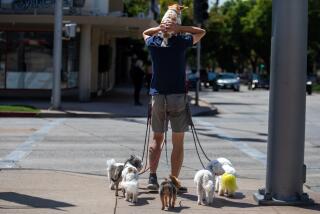Out of the Doghouse : Despite Puppy Love, Frank Parsons May Shut Down Kennel for Strays
- Share via
He can be as grouchy as a junkyard dog, but those who know Frank Parsons say his bark is worse than his bite.
Even so, dog lovers worry there may be teeth behind Parsons’ threat--his latest--to close down his Shoestring Kennel, which since 1954 has been home to thousands of abandoned strays, as well as paying customers.
“Business is bad, and I’m too old for it,” said the 81-year-old Parsons, who has a bad eye and walks with a limp.
His kennel is a twisting, handmade maze of wood and chain-link cages, shaded by trees, shrubs and fiberglass roofing--a sharp contrast to the modern, almost condo-like kennels now being built. The Shoestring looks like a bohemian plant nursery, but the smell gives it away.
For years, Parsons has dug into his own pocket to feed and house unwanted pets, making him a dependable ally of animal-rescue groups and a well-known figure among many San Fernando Valley animal lovers.
His kennel is home to 70 or so dogs. More than half are mutts abandoned by their owners or rescued by volunteers from the pound.
But now Parsons has decided not to accept any more stray dogs, and his talk of closing the kennel has prompted animal-rescue workers to plan an open house this weekend to find homes for the remaining animals.
“We’ve got to get all these orphaned dogs out,” said Leslie Kentor-Leahman, 37, who does volunteer work at the Shoestring, located on Canoga Avenue in Chatsworth. “We need to place about 40 dogs in homes.”
They are not prizewinners, either. Nearly all are mixed breeds, who live side by side in cement-floor cages, identified by small cards showing the date they were left. Some of the lucky ones have tree trunks sprouting from their cages.
“We built the whole damn thing,” Parsons said during a tour Wednesday. He lives alone in a house on the kennel property, with his pet Chihuahua, Kiki.
When Parsons arrived in California in 1945, there was little development in the northwest corner of the Valley. Now, his 30,000-square-foot property is squeezed between auto-repair shops and small manufacturers.
“I came out here from Michigan after the war,” Parsons said. “Some friends had a kennel that was doing pretty well, so I started one. For years this was a terrific business.”
Maybe it was the growth in apartment and condo living, or just the expense. For whatever reason, fewer and fewer paying customers frequent the Shoestring, which charges between $5 and $7 a day for boarders, Parsons said.
Even though many of the cages are empty, it costs about $2,000 a month to feed the remaining animals, said Parsons, passing a stack of 40-pound bags of chow. In addition to volunteers, Parsons has three employees.
Workers say the drop in business has hit Parsons hard.
“He’s old, he’s cranky, he gets mad,” said Nohe Gonzalez, 27, who has worked at the Shoestring for more than eight years.
But Gonzalez is not so sure his boss is really going to close down the operation.
“He threatens to close down and then a day or two later, he says, ‘I can’t close this place,’ ” Gonzalez said. “He’s been saying that as long as I’ve worked for him.”
Parsons is vague about his immediate plans. He is too busy to spend much time talking about it.
“Look at this little rat. Hey, Silky!” said Parsons, calling to a terrier mutt. “He’s been here about 20 years. Used to be a very sharp little dog, but he can’t see that well now.”
Silky’s three brothers and sisters were snatched up by owners years ago. And three times Parsons found Silky a home; each time the owners returned the dog.
“Silky had a hard time adapting,” Parsons said. “He would just run under the bed and stay there.”
Shaking his head, Parsons said of his longest boarder: “The little old man is still hanging on.”
More to Read
Sign up for Essential California
The most important California stories and recommendations in your inbox every morning.
You may occasionally receive promotional content from the Los Angeles Times.













